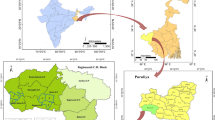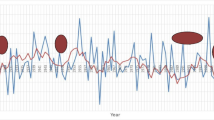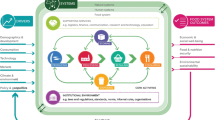Abstract
This paper aimed to investigate the determinants of water security in an irrigation scheme, and how this water security level subsequently affects the farmer’s household food security level. Water security refers to access by the irrigating households to sufficient and reliable water to meet the agricultural needs and their ability to assert the water rights against other parties. A random sample of 185 irrigating households was interviewed in Tugela Ferry Irrigation Scheme in Mzinyathi District, South Africa. Data were analysed using principal component analysis and ordinary least squares. The empirical results indicated that factors such as farmer’s age, off-farm income, farmer association membership, use of pumps, location on the upper-end of the canal and training increase household water security. Conversely, factors such as occurrence of conflicts and location at the tail-end of the canal were found to decrease household water security. This study highlights the importance of strengthening farmer organisational capacity and local institutions for enhancing the water security status of farmers in smallholder irrigation schemes. The results also indicated that perceived water security has a positive impact on household food consumption per adult equivalent. Therefore, for better impact on household food security, the study recommends that priority should be placed in ensuring household water security, not just investing in the physical irrigation scheme and irrigation participation. The human and social dimensions need to receive priority. Training farmers in collective water governance and water conservation techniques to improve water-use efficiency as well as introducing motorised pumps would take irrigators a long way in enhancing their water security.



Similar content being viewed by others
Notes
Water security is defined in this paper as access by the irrigating households to sufficient and reliable water to meet their agricultural needs and their ability to assert their water rights against other parties. The concept of water security is discussed in detail in the next section.
References
Achia, T. N. O., Wangombe, A., & Khadioli, N. (2010). A logistic regression model to identify key determinants of poverty using Demographic and Health Survey data. European Journal of Social Sciences, 13(1), 38–45.
Bacha, D., Namara, R., Bogale, A., & Tesfaye, A. (2011). Impact of small-scale irrigation on household poverty: empirical evidence from the Ambo District in Ethiopia. Irrigation and Drainage, 60, 1–10.
Backeberg, G. R., & Sanewe, A. J. (2010). Towards productive water use and household food security in South Africa. Paper presented at the 6th Asian Regional Conference of ICID, Yogyakarta, Indonesia, 10–16 October 2010.
Baker, J. L. (2000). Evaluating the impact of development projects on poverty: A handbook for practitioners. Washington, D.C: World Bank.
Basto, M., & Pereira, J. M. (2012). An SPSS R-menu for ordinal factor analysis. Journal of Statistical Software, 46(4), 1–29.
Bembridge, T. (2000). Guidelines for rehabilitation of small-scale farmer irrigation schemes in South Africa. WRC Report 891/1/00. Pretoria, South Africa: Water Research Commission.
Besley, T. (1995). Property rights and investment incentives: theory and evidence from Ghana. The Journal of Political Economy, 103(5), 903–937.
Bocoum, I., Dury, S., Egg, J., Herrera, J., & Prevel, Y. (2014). Does monetary poverty reflect caloric intake? Food Security, 6(1), 113–130.
Bruns, B. R., Ringler, C., & Meinzen-Dick, R. S. (Eds.). (2005). Water rights reform: Lessons for institutional design. Washington D.C: Vistaar Publications.
Cook, C., & Bakker, K. (2012). Water security: debating an emerging paradigm. Global Environmental Change, 22(1), 94–102.
Cousins, B. (2012). Smallholder irrigation schemes, agrarian reform and ‘accumulation from below’: Evidence from Tugela Ferry, KwaZulu-Natal. Paper presented at the Conference on ‘Strategies to overcome poverty and inequality: Towards Carnegie III’, University of Cape Town, South Africa, 3–7 September 2012.
Crewett, W., Bogale, A., & Korf, B. (2008). Land tenure: Continuity and change, shifting rulers, and the quest for state control. CAPRi Working Paper no. 91. Washington, D.C: International Food Research Institute (IFPRI).
Cullis, J., & O’Regan, D. (2004). Targeting the water-poor through water poverty mapping. Water Policy, 6(5), 397–411.
D’Haese, M., Vink, N., Nkunzimana, T., Van Damme, E., van Rooyen, J., Remaut, A.-M., et al. (2013). Improving food security in the rural areas of KwaZulu-Natal province, South Africa: too little, too slow. Development Southern Africa, 30(4–5), 468–490.
Denison, J., & Manona, S. (2007). Principles, approaches and guidelines for the participatory revitalization of smallholder irrigation schemes. Volume 1: A rough guide for irrigation development practitioners. WRC Report TT 309/07. Pretoria, South Africa: Water Research Commission.
Fanadzo, M. (2012). Revitalisation of smallholder irrigation schemes for poverty alleviation and household food security in South Africa: a review. African Journal of Agricultural Research, 7(13), 1956–1969.
Fanadzo, M., Chiduza, C., & Mnkeni, P. N. S. (2010). Overview of smallholder irrigation schemes in South Africa: relationship between farmer crop management practices and performance. African Journal of Agricultural Research, 5(25), 3514–3523.
Faurès, J.-M., & Santini, G. (2008). Water and the rural poor: Interventions for improving livelihoods in sub-Saharan Africa. Rome: Food and Agriculture Organization of the United Nations.
Filmer, D., & Pritchett, L. H. (2001). Estimating wealth effect without expenditure data-or tears: an application to educational enrollments in states of India. Demography, 38(1), 115–132.
Garson, G. D. (2008). Factor Analysis: Statnotes from North Carolina State University Public Administration Program. http://www2.chass.ncsu.edu/garson/pa765/factor.htm. Accessed 4 Feb 2013.
Gebregziabher, G., Namara, R. E., & Holden, S. (2009). Poverty reduction with irrigation investment: an empirical case study from Tigray, Ethiopia. Agricultural Water Management, 96, 1837–1843.
Grey, D., & Sadoff, C. W. (2007). Sink or swim? Water security for growth and development. Water Policy, 9, 545–571.
GWP. (2000). Towards water security: A framework for action. Stockholm: Global Water Partnership (GWP).
GWP (2012). Increasing water security – a development imperative. Perspective paper. Stockholm, Sweden: Global Water Partnership (GWP).
Hart, T. (2009). Exploring definitions of food insecurity and vulnerability: time to refocus assessments. Agrekon, 48(4), 362–383.
HLPE (2013). Investing in smallholder agriculture for food security. HLPE Report 6. A report by the High Level Panel of Experts on Food Security and Nutrition of the Committee on World Food Security. Rome: Food and Agricultural Organisation (FAO).
Hodgson, S. (2004). Land and water: The rights interface. Food and Agriculture Organisation (FAO) Legislative Study 84. Rome: FAO of the United Nations.
Hope, R. A., Gowing, J. W., & Jewitt, G. P. W. (2008). The contested future of irrigation in African rural livelihoods: analysis from a water scarce catchment in South Africa. Water Policy, 10, 173–192.
Howe, L. D., Galobardes, B., Matijasevich, A., Gordon, D., Johnston, D., Onwujekwe, O., et al. (2012). Measuring socio-economic position for epidemiological studies in low- and middle-income countries: a methods of measurement in epidemiology paper. International Journal of Epidemiology, 41, 871–886.
Hussain, I., & Hanjra, A. (2004). Irrigation and poverty alleviation: review of the empirical evidence. Irrigation and Drainage, 53, 1–15.
Inocencio, A., Kikuchi, M., Tonosaki, M., Maruyama, A., Merrey, D., Sally, H., et al. (2007). Costs and performance of irrigation projects: A comparison of Sub-Saharan Africa and other developing regions. IWMI Research Report 109. Colombo, Sri Lanka: International Water Management Institute.
Jacobs, P., & Makaudze, E. (2012). Understanding rural livelihoods in the West Coast District, South Africa. Development Southern Africa, 29(4), 574–587.
Kemerink, J. S., Ahlers, R., & van der Zaag, P. (2011). Contested water rights in post-apartheid South Africa: the struggle for water at catchment level. Water SA, 37(4), 585–594.
Komnenic, V., Ahlers, R., & van der Zaag, P. (2009). Assessing the usefulness of the water poverty index by applying it to a special case: can one be water poor with high levels of access? Physics and Chemistry of the Earth, 34, 219–224.
Kumar, M. D. (2003). Food security and sustainable agriculture in India: The water management challenge. IWMI Working paper 60. Colombo, Sri Lanka: International Water Management Institute.
Labadarios, D., Mchiza, Z. J. R., Steyn, N. P., Gericke, G., Maunder, E. M. W., Davids, Y. D., et al. (2011). Food security in South Africa: a review of national surveys. Bulletin of the World Health Organization, 89(12), 891–899.
Lele, U., Klousia-Marquis, M., & Goswami, S. (2013). Good governance for food, water and energy security. Aquatic Procedia, 1, 44–63.
Lipton, M., Litchfield, J., & Faures, J.-M. (2003). The effect of irrigation on poverty: a framework for analysis. Water Policy, 5, 413–427.
Machethe, C. L., Mollel, N. M., Ayisi, K., Mashatola, M. B., Anim, F. D. K., & Vanasche, F. (2004). Smallholder irrigation and agricultural development in the Olifants river basin of Limpopo Province: Management transfer, productivity, profitability and food security issues. WRC Report No 1050/1/04. Pretoria, South Africa: Water Research Commission.
Mbatha, C. N., & Antrobus, G. G. (2008). Institutions and economic research: a case of location externalities on agricultural resource allocation in the Kat River basin, South Africa. Agrekon, 47(4), 470–490.
Mnkeni, P. N. S., Chiduza, C., Modi, A. T., Stevens, J. B., Monde, N., van Der Stoep, I., et al. (2010). Best management practices for smallholder farming on two irrigation schemes in the Eastern Cape and KwaZulu-Natal through participatory adaptive research. WRC Report No. TT 478/10. Pretoria, South Africa: Water Research Commission.
Moobi, M. N., & Oladele, O. I. (2012). Factors influencing small scale farmers’ attitude and participation in formal financial markets in Mahikeng Municipality, South Africa. Journal Human Ecology, 30(1), 11–17.
Muller, M., Schreiner, B., Smith, L., van Koppen, B., Sally, H., Aliber, M., et al. (2009). Water security in South Africa. DBSA Working Paper Series No.12. Midrand: Development Bank of Southern Africa (DBSA).
Norman, E., Bakker, K., Cook, C., Aunn, G., & Allen, D. (2010). Water security: A primer. Policy report as part of research project entitled: Developing a Canadian water security framework as a tool for improved water governance for watersheds. Canada: Canadian Water Network.
Perret, S. (2002). Water policies and smallholding irrigation schemes in South Africa: a history and new institutional challenges. Water Policy, 4(3), 283–300.
Rijsberman, F. R. (2006). Water scarcity: fact or fiction? Agricultural Water Management, 80, 5–22.
Roscino, A., & Pollice, A. (2006). In S. Zani, A. Cerioli, M. Riani, & M. Vichi (Eds.), Data analysis, classification and the forward search (Studies in Classification, Data Analysis, and Knowledge Organization, pp. 135–142). Berlin: Springer.
Rose, D., & Charlton, K. E. (2002). Prevalence of household food poverty in South Africa: results from a large, nationally representative survey. Public Health Nutrition, 5(3), 383–389.
Schultz, B., & Uhlenbrook, S. (2007). Water security: what does it mean, what may it imply? Discussion Draft Paper. Delft, The Netherlands: UNESCO-IHE, Institute of Water Education.
Shah, T., van Koppen, B., Merrey, D., De Lange, M., & Samad, M. (2002). Institutional alternatives in African smallholder irrigation: Lessons from international experience with irrigation management transfer. IWMI Research Report 60. Colombo, Sri Lanka: International Irrigation Management Institute.
Sinyolo, S., Mudhara, M., & Wale, E. (2014). The impact of smallholder irrigation on household welfare: the case of Tugela Ferry irrigation scheme in KwaZulu-Natal, South Africa. Water SA, 40(1), 145–156.
Speelman, S. (2009). Water use efficiency and influence of management policies, analysis for the small-scale irrigation sector in South Africa. The Netherlands: Ghent University.
Stats SA (2007). A national poverty line for South Africa. http://www.treasury.gov.za/publications/other/povertyline/Treasury%20StatsSA%20poverty%20line%20discussion%20paper.pdf. Accessed 23 Aug 2012.
Tarlock, D., & Wouters, P. (2010). Reframing the water security dialogue. Journal of Water Law, 20(2), 53–60.
Tekana, S. S., & Oladele, O. I. (2011). Impact analysis of Taung irrigation scheme on household welfare among farmers in North-West province, South Africa. Journal of Human Ecology, 36(1), 69–77.
Terre-Blanche, M., Durrhheim, K., & Painter, D. (2006). Research in practice: Applied methods for social sciences. Cape Town: University of Cape Town Press.
Tesfaye, A., Bogale, A., Namara, R. E., & Bacha, D. (2008). The impact of small-scale irrigation on household food security: the case of Filtino and Godino irrigation schemes in Ethiopia. Irrigation Drainage Systems, 22(2), 145–158.
Tlou, T., Mosaka, D., Perret, S., Mullins, D., & Williams, C. J. (2006). Investigation of different farm tenure systems and support structure for establishing small-scale irrigation farmers in long term viable conditions. WRC Report No. 1353/1/06. Pretoria, South Africa: Water Research Commission.
Tshuma, M. C. (2012). A review of the poverty and food security issues in South Africa: is agriculture the solution? African Journal of Agricultural Research, 7(28), 4010–4020.
Tyler, S. (2007). Water demand management, poverty and equity. IDRC Water Demand Management Research Series Working Paper 2. International Development Research Centre (IDRC).
van Averbeke, W. (2008). Best management practices for small-scale subsistence farming on selected irrigation schemes and surrounding areas through participatory adaptive research in Limpopo Province. Draft Final Report of WRC Project K5/1464//4. Pretoria: Centre for Organic and Smallholder Agriculture (COSA), Department of Crop Sciences, Tshwane University of Technology.
van Averbeke, W. (2012). Performance of smallholder irrigation schemes in the Vhembe District of South Africa. In M. D. Kumar (Ed.), Problems, perspectives and challenges of agricultural water management. Rijeka: InTech.
van Averbeke, W., M’marete, C. K., Igodan, C. O., & Belete, A. (1998). An investigation into foodplot production at irrigated schemes in central Eastern Cape. WRC Report 719/98. Pretoria: Water Research Commission (WRC).
van Averbeke, W., Denison, J., & Mnkeni, P. N. S. (2011). Smallholder irrigation schemes in South Africa: a review of knowledge generated by the Water Research Commission. Water SA, 37(5), 797–808.
Vink, N. (2012). Food security and African agriculture. South African Journal of International Affairs, 19(2), 157–177.
Vyass, S., & Kumaranayake, L. (2006). Constructing socioeconomic status indexes: how to use principal component analysis. Health Policy and Planning, 21(6), 459–468.
Yokwe, S. (2009). Water productivity in smallholder irrigation schemes in South Africa. Agricultural Water Management, 96, 1223–1228.
Zeitoun, M. (2011). The global web of national water security. Global Policy, 2(3), 286–296.
Author information
Authors and Affiliations
Corresponding author
Rights and permissions
About this article
Cite this article
Sinyolo, S., Mudhara, M. & Wale, E. Water security and rural household food security: empirical evidence from the Mzinyathi district in South Africa. Food Sec. 6, 483–499 (2014). https://doi.org/10.1007/s12571-014-0358-0
Received:
Accepted:
Published:
Issue Date:
DOI: https://doi.org/10.1007/s12571-014-0358-0




